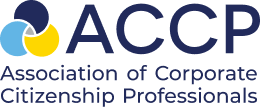Victor Cordon, Director Social Impact
Keenan Harrell, Program Manager, Community Impact
Okta
In 2020, following the death of George Floyd, we witnessed a racial reckoning that exposed the harmful inequities within our society, underscoring the need for systemic change.
Recognizing the magnitude of this movement and the urgent need for greater action, Okta made a 3-year, $3M racial equity philanthropy commitment – promising to remain transparent and accountable in how they drive tangible change.
Understanding that employee voice would be paramount to driving this commitment, Okta for Good stood up an employee advisory board to help direct early grantmaking. A few years later, the Board transitioned into a Racial Equity Philanthropy Fellowship – an experiential learning opportunity equipping more employees with tactics and expertise to drive racial equity via philanthropy’s core tenets – grantmaking, volunteerism, and advocacy.
To date, Okta for Good has engaged 14 employees as philanthropic leaders, enabling them with the resources, tools, and networks to advance racial equity alongside our communities.
The State of Racial Equity:
- U.S. companies pledged $340B to drive racial equity and fight racial injustice between May 2020 and October 2022.
- The pace of monetary commitments has slowed year-over-year (down 32 percent since 2021) – leading to grant declines to BIPOC-led and/or racial equity-focused nonprofits.
- Layoffs across multiple sectors and macroeconomic uncertainties have stalled internal DEI/staffing initiatives.
- Looming concern that the prioritization of racial equity as a corporate social impact focus area will not be sustained – and that corporate interests will shift to new and emerging issues.
Okta’s Racial Equity Philanthropy Fellowship aims to “equip changemakers with the experience, knowledge, and network to increase racial equity.” The Fellowship’s curriculum is advanced in two phases:
Phase 1: Learning
With the support of Okta’s trusted network of movement builders and nonprofit partners, Fellows learn about the importance of volunteerism and compelling storytelling, and gain insight into best practices for equitable grantmaking.
Phase 2: Taking Action
Fellows activate those learnings by leading a participatory grantmaking cycle, as well as volunteer initiatives and learning events in support of Okta for Good’s racial equity grantees. Examples include:
- Leading a virtual career exposure panel and connecting learners from Hack the Hood with Okta employees.
- Hosting a STEM Equity Advocates Training webinar with Techbridge Girls.
- Stewarding a $10k microgrant ($50k total) to five (5)small nonprofits aligned with Okta’s racial equity focus areas. Organizations supported include:
Creating a Racial Equity Framework
Before launching a program like this, companies should consider a strategic framework to inform and sustain their racial equity vision.
Decide where you want to go:
- Align on a shared vision of how your team/organization can best drive and sustain racial equity via social impact.
- Identify current and potential roadblocks to actualizing your vision and opportunities to address them.
Identify stakeholders and collect insights:
- Identify the individuals, organizations, groups, and communities that can help move your racial equity work forward.
- Crowdsource recommendations, ideas, and guidance on racial equity best practices through trust-based conversations.
Activate and re-evaluate:
- Leverage insights to identify your focus areas and drive consensus on how you’ll move forward.
- Build and execute programming, then reevaluate regularly.
Recommendations on how to identify, leverage, and engage with internal and external stakeholders to generate support for your company’s racial equity work:
- Invite key leaders, influencers, and decision-makers within your company to support your racial equity work (i.e., ask them how they’d like to support your work, invite them to attend or speak at an event, establish an evaluation committee to review applications for each Fellowship cohort and invite them to join as an evaluator, etc.)
- Provide proactive updates to internal and external stakeholders about your racial equity work. Leverage intentional storytelling to highlight your impact.
- Regularly ask your network of nonprofit partners, community leaders, movement builders, funders, and conveners like ACCP for insight, recommendations, and guidance to inform your racial equity work.

